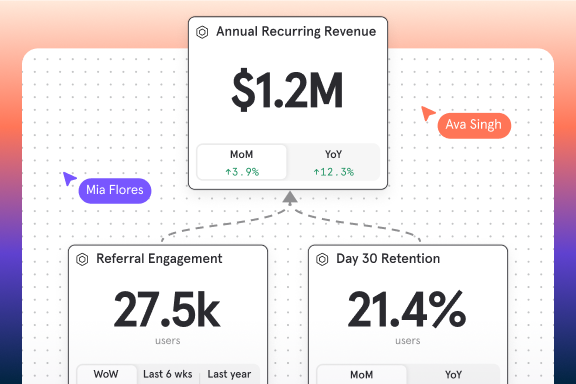Olo’s Recipe for Success: Boosting Conversion Rates by 7.8% with Mixpanel
Company
Olo is a leading open SaaS platform for restaurants that enables hospitality at every guest touchpoint. Millions of orders per day run on Olo’s on-demand commerce engine, providing restaurants a single source to understand and serve every guest from every channel, whether direct or third-party. With integrations to over 300 technology partners, Olo customers can build personalized guest experiences in and outside of their four walls, utilizing one of the largest and most flexible restaurant tech ecosystems on the market. Over 600 restaurant brands trust Olo to reach their 85 million connected guests across 77,000 locations.
What you’ll learn
- How Olo uses Mixpanel to run A/B testing analysis across their platform
- How Olo boosted their conversion rate by 7.8% using insights from Mixpanel
- How you can successfully advocate for an event tracking tool at your company
Challenge
Olo’s customers needed both product analytics and actionable advice on how to optimize food ordering flows. But before using Mixpanel, Olo wasn’t tracking relevant metrics and couldn’t serve up insights, leaving product leaders to make decisions in the dark.
Solution
Since partnering with Mixpanel, Olo has tested long-held but unproven hunches around product usage. They’ve been able to prove that guest checkout options increase conversions and make design tweaks that reduce funnel drop-off. Olo continues to use Mixpanel to map the online ordering experience and make better product design and engineering decisions.
Results
- Increased conversion by 7.8% through A/B experimentation results
- Reduced data analysis time (uncovering spikes in data) by 80%
- Gained clarity in decision-making through iterative testing and data insights
Approach
The beginning of a partnership between Olo and Mixpanel
The team at Olo knows a lot about one side-effect of innovation: laughter.
When, in 2005, the SaaS platform for restaurants predicted that mobile ordering would be a huge part of the food industry, it was laughable. And, early in the 2010’s, when Olo saw the future of restaurants as revolving around the pick-up window and delivery? “People laughed at us.”
As the restaurant experience evolved over the next decade, however, the laughter faded. Olo grew, both in terms of business and in size, attracting a pool of forward-thinking individuals.
One of these was Janna Sheng, the Director of Product Management at Olo. Her tenure at Olo has been marked by a keen understanding of possibility for future improvement—including a campaign of advocacy that led to Olo’s partnership with Mixpanel.
“It’s really hard to answer questions unless you have the data.”
It started when Sheng saw a pattern: customers were asking questions, and those questions were left unanswered. The concerns ranged from the holistic—“Can you tell me some best practices?”—to the specific—“What should I be doing here in the flow to improve my rates?”—but they were connected by a key fact. Olo didn’t have enough information to give answers.
This struck Sheng as part of a larger issue: the inability to provide concrete advice or point to verifiable metrics was a less-than-ideal look for a company trying to be a leader in online food ordering. The future of Olo, as she saw it, required an analytics tool.
Laying the groundwork—a grassroots approach
The most important step towards advocating for an analytics solution was getting people to ask a simple question: Why did Olo need tracking and data?
Sheng understood that she needed to do more than pose questions, however. She needed to introduce a vision for the future.
“I’m really sorry but I don’t have this information,” she’d say, again and again. “But, you know, we could have this information if we were tracking it. And to track it we would either need to build our own solution or we could partner with a company that’s already doing this.”
The repetition, for Sheng, was key to creating support for an analytics solution internally. By including the call for a solution in what she refers to as her “regular talk track,” she could start a conversation with other people at her company.
This grassroots approach worked. “I would enter a room and hear two account managers talking and they’d be using my talk track: we don’t have this data but there’s a way to get it.”
Breakthrough and implementation
In 2020, Sheng began her search for an event-tracking tool. It was a breakthrough moment.
She oversaw the evaluation of various event-tracking tools, understanding that it was imperative to find a solution that was comprehensible for everyone. If engineers were able to implement events but people on the other end struggled to understand data, Sheng thought, “we’re back to where we were without any solution.”
To test the clarity of the tools, Sheng gave people from the product, design, and engineering teams a mission: to complete tasks (including looking at conversion rate and measuring parts of the funnel) and report back on which of two competing tools—Heap and Mixpanel—was easier to use. 70% opted for Mixpanel over Heap, and a partnership was born.
“You want to know you’re making an impact”—A/B testing insights
When Janna looks back at the outcomes that resulted from Olo’s implementation of Mixpanel, she thinks immediately of Olo’s use of A/B testing insights.
“A/B testing was a new practice at Olo,” she recalls. “I pushed for an initial A/B test to get people excited about the data.”
The gambit paid off. The first A/B test—which gave concrete evidence of a long-held hypothesis that a prominent guest checkout option drives engagement—showed a thrilling 7.8% conversion gain. It was exactly the kind of data she was looking for.
“When you show up to work, you want to know that you’re making an impact,” says Sheng. “And, suddenly, I had the granular data to show everyone they were making an impact.”
Suddenly, I had the granular data to show everyone they were making an impact.Janna Sheng Director of Product Management, Olo
This opened the doors to further A/B testing, fueled by general enthusiasm and an appetite for data. Olo turned their attention to a more complex issue: whether removing elements of decision-making from the order process led to conversion gains.
The design team came back with an outline for big, swing-for-the-fences changes, but Sheng urged the team to slow down and examine the available information.
“If we have the data and we have the tools and 85 million customers, do we really want to risk a big redesign and have conversions drop significantly?” Sheng asked. Instead, she suggested, wouldn’t it be a better idea to test hypotheses along the way, breaking the design down into smaller parts and examining specific points of data?
It was, as it turned out, a better idea. The first A/B test showed that Olo’s hypothesis was faulty, and a small design tweak resulted in conversions declining. People got through the funnel faster, but dropoff occurred at a crucial moment right before they placed their order.
It was time to pause, reconsider, and examine the data.
This process allowed Olo to figure out how to both reverse the decline and retain gains from the beginning of the funnel. “Because we could see where the decline was actually happening,” says Sheng, “the teams could focus and use the data to inform what their next action items should be.”
Progress, for me, is if you’re constantly learning. If you’re able to take new information and make changes to your plan in an adaptive way, that’s progress.Janna Sheng Director of Product Management, Olo
The learning path is paved with data
For Sheng, the larger application of Mixpanel and data analytics is connected to learning and progress.
As Sheng sees it, progress is an interplay between curiosity, knowledge, and reframing. It’s what attracted her to Olo’s innovative vision in the first place, and what fueled her advocacy for a partnership with Mixpanel, and a reason she values data analytics.
“Progress, for me, is if you’re constantly learning,” Sheng says. “If you’re able to take new information and make changes to your plan in an adaptive way, that’s progress.”
Thousands of companies use Mixpanel to build better products. See what Mixpanel can do for your team. Create your free account today.

